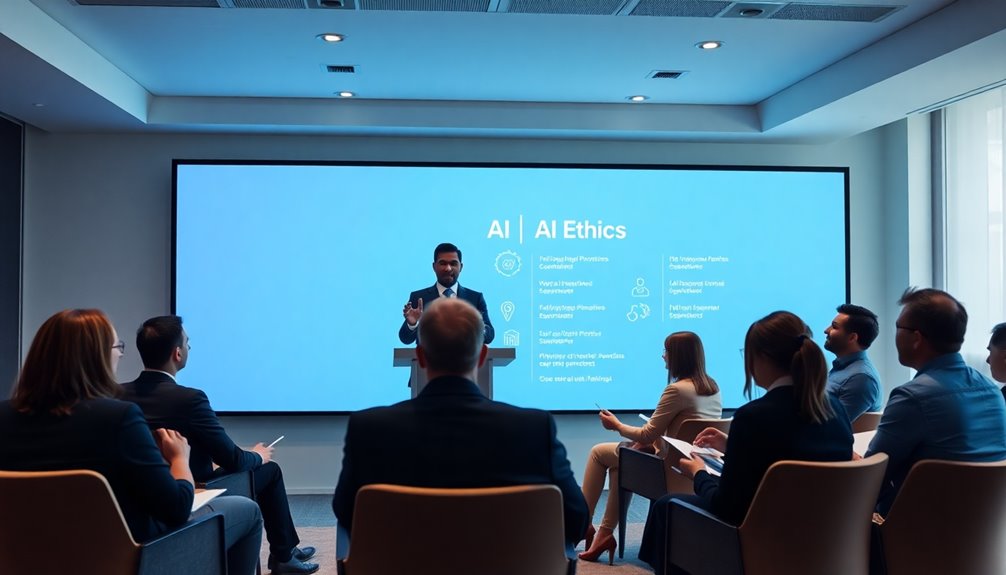To ace your AI ethics officer interview, you need to embrace a few game-changing secrets. Understanding recent controversies around AI can make you stand out. Don't forget to showcase your insights on transparency and ethical implications. Highlight your passion for inclusivity in tech, especially regarding women in leadership. Dress professionally to convey seriousness, and have a set of insightful questions ready to show genuine interest. Most importantly, be prepared to articulate how you'd handle ethical dilemmas. Trust me, mastering these techniques is crucial for success, and soon you'll uncover even more strategies to boost your confidence.
Key Takeaways
- Research the company's ethical AI commitments, focusing on recent actions and controversies to demonstrate informed interest during the interview.
- Prepare to discuss the significance of transparency in AI for building public trust and its implications for ethical practices.
- Understand the importance of diverse perspectives in tech and how they contribute to responsible AI innovation and decision-making.
- Dress professionally in tailored attire to convey seriousness, as first impressions significantly impact interview outcomes.
- Follow up with a thank-you email highlighting key discussion points to reinforce your interest and engagement with the company.
Introduction to Job Interviews

Job interviews are your chance to shine and demonstrate why you're the perfect fit for the role. They're pivotal moments that can determine your career trajectory, especially in fields like AI ethics where understanding technologies such as facial recognition is crucial. The format of interviews can vary widely, from traditional one-on-one conversations to panel interviews and even virtual meetings via video conferencing platforms.
To set yourself apart, you should prepare for common interview questions, focusing on behavioral and situational queries. This preparation can boost your confidence and enhance your performance. It's essential to research the company's values, culture, and recent developments. That way, you can tailor your responses to show how you align with the organization's mission, particularly regarding ethical considerations in AI.
Practicing active listening during the interview is equally important. When you ask insightful questions, it not only shows your genuine interest but also leaves a positive impression on the interviewers. Remember, each interaction is an opportunity to showcase your knowledge and passion for the role, making you a standout candidate in the evolving landscape of AI ethics.
Preparing for the Interview

To ace your AI ethics officer interview, start with thorough research and honest self-assessment. Make sure your resume and application reflect your understanding of current ethical challenges in AI, while also showcasing your unique qualifications. Finally, practice interview techniques that allow you to articulate your insights confidently and clearly. Additionally, familiarize yourself with the importance of ethical frameworks in guiding responsible AI deployment.
Research and Self-Assessment
Preparing for your AI ethics officer interview starts with thorough research and self-assessment. Begin by diving into recent corporate actions, like IBM's $69.8 million contract for a biometric platform. This highlights the complexities of ethical decision-making in AI you'll likely discuss. Understand the ethical responsibilities of industry leaders, such as IBM's decision to abandon facial recognition technology to combat systemic injustices.
Next, examine the impact of ethical breaches on public trust in AI. Recognize that transparency and accountability are vital for rebuilding user confidence. You should also prepare to articulate the importance of diverse perspectives in ethical AI, particularly the contributions of women in technology and inclusive design.
Finally, stay current on trends and best practices in ethical AI frameworks. Organizations are increasingly prioritizing collaboration with ethical boards, so familiarize yourself with these practices and how they relate to societal impacts. This comprehensive preparation will not only enhance your understanding but also enable you to present yourself as a knowledgeable, forward-thinking candidate ready to tackle the challenges in AI ethics. Additionally, consider how AI ethics and responsible development emphasizes the need for accountability in AI technologies, further showcasing your preparedness for the interview.
Resume and Application Preparation
Crafting a standout resume and application is crucial for landing your AI ethics officer interview. Start by highlighting your understanding of the ethical implications of AI, referencing recent corporate actions like IBM's $69.8 million biometric contract awarded in 2023. This example illustrates the contradictions in corporate commitments to ethical AI practices, showcasing your awareness of the landscape.
Emphasize your knowledge of transparency in AI development, addressing the erosion of public trust and its impact on successful integration. Make it clear that you recognize the necessity for organizations to prioritize ethical frameworks, collaborate with ethical boards, and continuously assess AI's societal impact.
Don't forget to mention the significance of inclusive design and women's leadership in ethical AI. This demonstrates your commitment to balanced decision-making in technology.
Additionally, express your belief in integrating education on ethical AI practices into tech curricula. This shows your dedication to fostering a future generation that values ethical integrity alongside innovation. Furthermore, highlight the importance of cultural intelligence as a means to navigate diverse ethical perspectives in AI development. By focusing on these key areas, you'll create a compelling application that positions you as a strong candidate for the role of AI ethics officer.
Interview Preparation Techniques
Mastering interview preparation for the AI ethics officer role requires a strategic approach. Start by researching the company's past actions and commitments regarding ethical AI. For instance, look into IBM's pledge to abandon facial recognition technology and their 2023 contract for a biometric platform. This knowledge will help you address potential contradictions and demonstrate your awareness of the company's stance on ethical issues.
Next, familiarize yourself with recent controversies in AI ethics. Be prepared to discuss how these scenarios impact public trust and corporate accountability, emphasizing the importance of transparency in AI development. Articulate how transparency can help rebuild trust, particularly after ethical breaches.
Additionally, highlight the significance of women's leadership in technology. Mention initiatives like Code Like A Girl to showcase the need for diverse perspectives in tech innovation. Be ready to propose concrete ideas for prioritizing ethical frameworks in AI development and suggest collaborative efforts between tech companies and ethical boards. This proactive approach shows your commitment to continuous assessment of AI's societal impact and positions you as a forward-thinking candidate.
Moreover, understanding cultural intelligence (CQ) is crucial as it enhances your ability to relate and work effectively across diverse cultural contexts in the tech industry.
Dressing for Success

When preparing for your AI ethics officer interview, choosing the right attire is crucial. Dressing professionally not only shows respect for the role but also boosts your confidence. Let's explore some general guidelines, gender-specific tips, and how to adapt your outfit for different seasons and casual settings. Additionally, consider how your attire can reflect your personal brand and values, as this can resonate well with interviewers in the tech industry.
General Attire Guidelines
Preparing for an AI ethics officer interview means dressing the part to make a strong first impression. Your appearance can significantly influence how interviewers perceive your seriousness about the role and the importance of ethical considerations in AI. Research shows that candidates who wear business formal attire are viewed as more competent and credible, which is crucial in this field.
Opt for neutral colors like navy, gray, or black. These shades convey professionalism without distracting from your qualifications and expertise. Ensure your clothing is clean, well-fitted, and appropriate for a corporate environment; this demonstrates your respect for the interview process and the organization's values.
Keep accessories minimal and tasteful. A simple watch or small jewelry can enhance your overall appearance without overwhelming your message of professionalism and ethical responsibility. Remember, the goal is to present yourself as someone who embodies the values of the position you're applying for.
Gender-Specific Attire Tips
As you get ready for your AI ethics officer interview, it's crucial to consider how your attire reflects your professional identity. Dressing in professional attire that aligns with the tech industry significantly boosts your confidence and presents a polished image. If you identify as a woman in tech, think about wearing tailored suits or business dresses that convey authority while showcasing your personal style. Research shows that your appearance can influence perceptions of competence, so make it count.
Opt for colors that exude professionalism like navy, black, or gray, while softening the look with lighter tones to show approachability—an essential trait in an ethics-focused role. Accessories should be subtle; choose professional jewelry and footwear that complement your outfit without overshadowing your qualifications and expertise.
Lastly, make sure your clothing fits well and feels comfortable. This comfort allows you to maintain focus during the interview, enabling you to engage more effectively with your interviewers. Remember, success starts with the right impression, and your attire can set the tone for a productive conversation about AI ethics.
Seasonal and Casual Attire
Impression plays a pivotal role in your success during an AI ethics officer interview, and dressing appropriately for the season can enhance that impact. In the tech industry, business casual attire is generally accepted, striking a balance between professionalism and approachability. Opt for neutral colors like navy, gray, or black to convey credibility and keep the focus on your qualifications and ideas.
When it comes to accessories, simplicity is key. A straightforward watch or understated jewelry can complement your outfit without drawing attention away from your message. Footwear also matters; clean and polished shoes show attention to detail, reinforcing your professionalism.
Ensure your clothing fits well and feels comfortable. When you're confident in your appearance, it positively influences your interview performance. Seasonal adjustments can also play a role; consider lighter fabrics in warmer months and warmer layers in colder weather, maintaining that business casual standard. Additionally, it's important to remember that early morning flights generally experience calmer weather conditions, which can also reflect how well you manage stress and preparation for your interview.
Ultimately, your attire should reflect your respect for the opportunity while showcasing your personality. By dressing thoughtfully, you set the stage for a successful interview, allowing your skills and insights to shine through.
Mastering Interview Questions

When preparing for your AI ethics officer interview, it's crucial to master common interview questions and understand the nuances of behavioral and situational inquiries. You'll want to anticipate industry-specific questions that test your knowledge of ethical frameworks and current practices. Additionally, familiarize yourself with advanced questioning techniques that can showcase your critical thinking and adaptability in real-world scenarios. Understanding the implications of cybersecurity vulnerabilities in AI systems is essential for addressing ethical concerns effectively.
Common Interview Questions
In preparation for your AI ethics officer interview, you should anticipate a variety of questions that probe your understanding of ethical implications in AI development. Expect queries about IBM's recent contracts that seemingly contradict their earlier commitments to ethical practices. Be ready to discuss how transparency in AI development can foster public trust, especially when corporate actions raise ethical concerns.
You might also face questions regarding the role of women in technology and how inclusive design can drive ethical AI initiatives. It's essential to articulate how diversity within teams can lead to more responsible outcomes in tech innovation.
Interviewers may inquire about the frameworks your organization should prioritize to ensure ethical AI development. You should emphasize the necessity of collaborating with ethical boards and conducting continuous assessments of AI's societal impact.
Finally, be prepared to talk about the importance of integrating education on ethical AI practices into tech curricula. This shows your commitment to long-term success in the field and the promotion of responsible AI use. By addressing these common questions, you'll demonstrate your readiness for the role.
Behavioral and Situational Questions
Navigating behavioral and situational questions during your AI ethics officer interview can be a challenge, but it's a chance to showcase your practical experiences and moral reasoning. Expect questions that dive deep into your ability to handle ethical dilemmas in AI. For instance, be ready to discuss a time when you had to balance innovation with ethical considerations.
You might also face scenarios where you'll need to advocate for transparency in AI development to rebuild public trust. Think of specific instances where you've collaborated with diverse teams to promote inclusive design and ethical practices in technology.
Highlight how you understand the importance of continuously assessing AI's societal impact. Explain how you would implement this in a corporate setting, demonstrating your proactive approach.
Finally, show your knowledge of the evolving landscape of ethical AI and emphasize the need for education and training on ethical frameworks within tech curricula. By preparing concrete examples and articulating your thought process, you'll position yourself as a strong candidate who's ready to tackle the ethical challenges in AI.
Industry-Specific Questions
As you prepare for your AI ethics officer interview, it's important to gear up for industry-specific questions that assess your understanding of current challenges and trends. Familiarize yourself with recent ethical dilemmas, like IBM's $69.8 million contract for a biometric platform, which contradicts its commitments to ethical AI practices. Be ready to discuss how such actions can affect public trust in technology.
Transparency in AI development is crucial, and you should articulate why ethical breaches can lead to erosion of trust. Understand the role of women in technology; their leadership can bring balanced perspectives that are vital for ethical AI practices. You'll want to highlight the necessity for organizations to prioritize ethical frameworks and collaborate with ethical boards to ensure responsible innovation.
Moreover, emphasize the importance of continuously assessing AI's societal impact and advocating for education on ethical AI practices within tech curricula. By showing your awareness of these issues, you'll demonstrate that you're not just a candidate, but a thought leader ready to navigate the complex ethical landscape of AI.
Advanced Question Techniques
Mastering advanced question techniques is essential for showcasing your expertise during the AI ethics officer interview. Start by understanding the ethical implications of AI, especially in light of real-world examples like IBM's conflicting actions regarding ethical AI practices. Be prepared to discuss how innovation can sometimes clash with ethical considerations, and how organizations must navigate these dilemmas to maintain accountability.
Anticipate questions that probe your understanding of public trust issues in AI. You should articulate how contradictory corporate actions can foster skepticism among users and emphasize the critical need for transparency in AI development.
Highlight the role of women in technology and ethical AI, showcasing the importance of diverse perspectives in creating responsible AI solutions. This not only reflects your awareness of inclusivity but also aligns with current trends in tech.
Lastly, demonstrate your grasp of future directions in ethical AI. Discuss the collaboration between tech companies and ethical boards, as well as the importance of integrating ethical education into tech curricula. Additionally, emphasize how predictive modeling can enhance decision-making by providing data-driven insights that inform ethical considerations. By mastering these advanced question techniques, you'll position yourself as a knowledgeable candidate ready to tackle the complexities of AI ethics.
Asking Insightful Questions

Asking strategic questions during your AI ethics officer interview can set you apart from other candidates. Focus on how the organization balances innovation with ethical considerations, and how it ensures transparency in its AI projects. Ending with thoughtful closing questions will reinforce your interest and understanding of the role's complexities.
Strategic Questions to Impress
Navigating an AI ethics officer interview requires you to engage thoughtfully with your potential employer by asking strategic questions that reveal your depth of understanding. Start by inquiring about the ethical implications of AI technologies. For instance, you might ask how the organization reconciles recent controversies, like IBM's biometric platform contract, with its commitment to ethical practices. This demonstrates your awareness of the current scrutiny surrounding AI.
Next, ask how the organization plans to rebuild public trust in AI. Highlight the importance of transparency and accountability in this process. You can also explore the organization's collaboration with ethical boards, emphasizing that fostering partnerships is crucial for prioritizing ethical frameworks in AI development.
Don't forget to discuss inclusive design. Ask how they incorporate diverse perspectives, especially from women in STEM, to create more balanced and ethical AI solutions. Finally, inquire about the educational initiatives they support to promote ethical AI practices. This shows your commitment to continuous assessment of AI's societal impact, a vital aspect for the long-term success of any organization in this space.
Closing Questions
Engaging with your interviewers through insightful closing questions can leave a lasting impression and reinforce your interest in the role. Start by asking about the company's commitment to ethical AI frameworks. This not only shows your dedication to industry standards but also reveals how the organization aligns with public expectations.
Next, inquire about how they balance innovation with ethical considerations, especially in light of recent controversies, like IBM's biometric platform contract. This question demonstrates your awareness of current events and the complexities organizations face.
Don't forget to address transparency practices in AI development. Asking about this is crucial for understanding how the company aims to rebuild public trust and accountability.
Explore the importance of diverse perspectives in ethical decision-making, particularly from women in tech. This inquiry highlights your commitment to inclusivity and the broader impact of AI initiatives.
Finally, request information on ongoing education and training programs focused on ethical AI practices. This can indicate the company's long-term dedication to ethical integrity. By asking these targeted questions, you not only gain valuable insights but also solidify your candidacy as a thoughtful and engaged candidate.
Effective Communication and Presentation

To ace your AI ethics officer interview, you need to master effective communication and presentation skills. Crafting the perfect response is just the beginning; your body language and confidence play a crucial role in how your message is received. By honing these skills, you can ensure your insights resonate with both technical and non-technical audiences. Additionally, understanding the importance of ethics in AI technology can further bolster your credibility during the interview process.
Crafting the Perfect Response
While preparing for your AI ethics officer interview, it's crucial to communicate your insights clearly and confidently. Start by articulating a solid understanding of the ethical implications and societal impact of AI technologies. Reference IBM's recent commitments and contradictions to highlight the need for transparency and accountability. By discussing the public's growing skepticism, especially concerning contracts like IBM's $69.8 million biometric deal, you show that you're in tune with current concerns.
Next, emphasize the importance of collaboration between tech companies and ethical boards. Highlight the necessity for ongoing assessments of AI's societal impact, demonstrating your commitment to fostering ethical frameworks. Bring in the topic of inclusive design and diverse leadership, particularly the contributions of women in tech. This illustrates your understanding of how varied perspectives enhance ethical decision-making.
Additionally, consider integrating concepts from healing past wounds, as acknowledging the ethical missteps of the past can foster a culture of accountability and improvement within the industry. Finally, propose educational initiatives that promote ethical AI practices within tech curricula. This proactive approach not only addresses long-term challenges but also positions you as a forward-thinking candidate. Tailoring your responses to these key areas will make your communication effective, showcasing your qualifications and passion for ethical AI development.
Body Language and Confidence
Effective body language plays a crucial role in how you present yourself during your AI ethics officer interview. Research shows that 55% of communication is non-verbal, meaning your gestures, posture, and eye contact can significantly impact the impression you make. Maintaining eye contact not only shows confidence but also engages your interviewer, making them more likely to connect with you.
Use open gestures to emphasize your points, and practice standing tall with your shoulders back. This confident posture will enhance your own feelings of authority and make you appear more self-assured. Additionally, engage in active listening by nodding and mirroring the interviewer's body language. This fosters rapport and demonstrates your attentiveness.
To refine your body language, practice in front of a mirror or record yourself. This will help you identify areas for improvement in both body language and vocal delivery. Remember, a confident presentation not only communicates your qualifications but also your readiness to tackle the ethical challenges in AI. So, focus on your body language, and you'll be well on your way to crushing your interview.
Post-Interview Strategies

After your interview, it's crucial to follow up with a thank-you email within 24 hours to reinforce your interest and highlight key points from your conversation. If you receive an offer, think carefully about how it aligns with your goals, and if you face rejection, don't hesitate to ask for feedback to improve for next time. Staying engaged with the company and the field will keep you prepared for future opportunities.
Follow-Up Communications
Sending a personalized thank-you email within 24 hours of your interview can significantly impact your candidacy. In this email, express gratitude for the opportunity and reiterate your interest in the AI Ethics Officer position. This shows professionalism and enthusiasm, which interviewers appreciate.
Additionally, follow up with relevant insights or reflections about ethical AI practices discussed during your interview. This demonstrates your engagement and expertise in the field, making you a memorable candidate. Be sure to keep an eye on the company's recent activities related to ethical AI, such as their commitments or any controversies. Mentioning these aspects in your follow-up will highlight your awareness of the industry's landscape.
If you haven't heard back within the timeframe the interviewers provided, don't hesitate to send a polite follow-up email after one to two weeks to inquire about your application status. Lastly, consider utilizing social media platforms like LinkedIn to connect with your interviewers. Share relevant articles or insights on ethical AI to keep the conversation going and showcase your ongoing interest in the field. These follow-up strategies can enhance your chances of landing the job.
Handling Offers and Rejections
Navigating offers and rejections can be a pivotal moment in your job search. After an interview, always send a personalized thank-you email within 24 hours. This gesture expresses gratitude and reinforces your interest in the position. If you receive a job offer, take the time to assess the organization's commitment to ethical AI practices. This reflects their values and should align with your professional principles.
In the case of a rejection, don't hesitate to request constructive feedback from the interviewers. Understanding areas for improvement not only enhances your future performance but also shows your commitment to growth. Even if you didn't get the job, maintaining a positive relationship with the company is crucial. Networking can lead to future opportunities or collaborations in the field of ethical AI.
Stay informed about the company's initiatives and developments in AI ethics. Demonstrating ongoing interest can position you favorably for future openings. Remember, every interaction counts and can pave the way for your next big opportunity! By strategically handling offers and rejections, you can turn any situation into a step forward in your career.
Interviewing Remote Candidates

When interviewing remote candidates for an AI ethics officer position, you need to leverage technology effectively to assess their communication skills. Pay attention to language nuances and dialects, as these can influence how ethical dilemmas are discussed. Address emerging AI ethical dilemmas during the interview to better understand how candidates think critically about real-world issues.
Remote Interview Technologies
In today's interconnected world, remote interview technologies are revolutionizing how organizations connect with candidates. These tools allow you to efficiently reach talent from diverse geographical locations, enhancing your chances of finding the perfect fit for the AI Ethics Officer role. Companies commonly use video conferencing platforms like Zoom, Microsoft Teams, and Google Meet, providing a seamless experience for real-time communication.
Virtual interviewing platforms streamline the hiring process by integrating features such as automated scheduling and candidate screening. This not only saves time but also improves the overall candidate experience. However, security and privacy concerns are crucial here. Organizations often implement measures like end-to-end encryption and secure data handling practices to protect your information during the interview.
Additionally, AI-driven tools are transforming remote interviews by offering automated interviewers and candidate evaluation systems. These technologies provide valuable insights into candidate responses, enhancing decision-making processes. As you prepare for your interview, familiarize yourself with these technologies, as they'll likely play a significant role in how your potential employer assesses your fit for the position. Embrace this digital shift, as it can open doors to opportunities you may not have considered before.
Language Nuances and Dialects
Understanding language nuances and dialects is vital for effectively interviewing remote candidates. Variations in language can significantly impact communication and comprehension, so you need to be aware of these differences. Research shows that around 70% of communication is non-verbal, highlighting the importance of recognizing regional dialects and cultural contexts to prevent misinterpretations.
When conducting remote interviews, consider using standardized language or providing context for terms that may differ by region. This approach ensures you assess all candidates fairly, regardless of their background. Additionally, employing language assessment tools can help gauge candidates' proficiency in the primary interview language, fostering smoother interactions and more accurate evaluations.
It's also crucial to acknowledge potential language barriers and actively promote an inclusive environment. By doing so, you enhance candidate comfort, encouraging open dialogue during interviews. This not only helps you gauge their qualifications effectively but also fosters a sense of belonging, which is essential for any team. Remember, successful communication is key to identifying the best fit for your AI ethics officer role.
Emerging AI Ethical Dilemmas
Navigating the emerging ethical dilemmas in AI during remote candidate interviews is more crucial than ever. As remote work continues to grow, organizations face significant challenges in ensuring fairness and accountability in algorithmic decision-making. You must recognize that potential biases in AI systems can be exacerbated by remote hiring practices, which might overlook diverse talent pools.
Transparency is vital. Candidates often lack awareness of how their data is utilized in AI-driven selection processes. You need to advocate for clear communication regarding data usage and how AI tools impact candidate evaluations. Ethical considerations also include safeguarding privacy while ensuring AI algorithms don't unintentionally discriminate against marginalized groups.
To tackle these dilemmas, it's essential to support the development of robust frameworks that guide ethical AI practices in remote hiring. Emphasizing continuous evaluation and adaptation to emerging challenges is key. By staying informed and proactive, you can help shape a fairer hiring landscape. Remember, addressing these ethical issues not only enhances your organization's reputation but also fosters a more inclusive work environment. Be prepared to discuss these topics in your interview, showcasing your commitment to ethical AI practices in remote hiring.
Confidence and Mindset

Building unshakeable confidence is essential for your success as an AI ethics officer. By incorporating inspirational strategies and motivational techniques, you can enhance your self-assurance and effectively tackle complex ethical dilemmas. Let's explore how you can cultivate this mindset to shine during your interview.
Building Unshakeable Confidence
In the lead-up to your AI ethics officer interview, confidence can be your strongest ally. To build unshakeable confidence, start by deeply understanding the ethical implications of AI technologies. Familiarize yourself with real-world cases, like IBM's $69.8 million biometric platform contract, to articulate the importance of accountability and transparency in AI development.
During the interview, emphasize the need for collaboration between tech companies and ethical boards. This shows you recognize the complexities of integrating ethical frameworks into AI practices. Highlighting your awareness of women's leadership in technology and ethical AI can further demonstrate your commitment to inclusive design and diverse perspectives, which are crucial for balanced decision-making.
Adopt a mindset of continuous learning regarding AI's societal impact and ethical considerations. This proactive approach not only enhances your confidence but also showcases your dedication to addressing challenges in the field. When you walk into the interview, armed with knowledge and a clear understanding of these critical issues, you'll project confidence that resonates with your interviewers. Remember, confidence comes from preparation and understanding, so invest the time to master these elements before your big day.
Inspirational and Motivational Strategies
When preparing for your AI ethics officer interview, it's crucial to inspire yourself with a mindset rooted in ethical responsibility and continuous learning. Embrace the narrative of ethical AI by sharing influential commitments, like IBM's decision to abandon facial recognition technology, which aims to create a more just society. Recognize the importance of transparency; stakeholders are demanding accountability, and your understanding of this can help rebuild public trust.
Cultivate confidence by examining the paradoxes in tech, such as IBM's $69.8 million contract for a biometric platform, and discuss how these examples highlight the delicate balance between innovation and ethics. Draw inspiration from the increasing recognition of women's leadership in tech; diverse perspectives enhance ethical discussions and drive innovation.
Prepare to articulate your commitment to continuous education on ethical AI practices. This demonstrates your dedication to fostering a culture of integrity and responsibility within the tech industry. By framing your mindset around these principles, you'll not only feel more confident but also inspire others to embrace ethical practices in AI development.
Practice With a Mock Interview

To ace your AI ethics officer interview, start with a mock interview that hones in on key ethical dilemmas, like biometric technology. Make sure you're familiar with recent case studies and can discuss their implications for corporate responsibility. This practice will help you articulate essential points, ensuring you're fully prepared when it counts.
Essential Items and Preparation
Conducting a mock interview is a crucial step in your preparation for an AI ethics officer position. This practice not only helps you articulate your understanding of ethical frameworks in AI but also equips you to handle the scrutiny surrounding AI tools. Familiarize yourself with recent actions from companies like IBM, such as their $69.8 million biometric platform contract, to discuss the challenges of balancing innovation with ethical responsibilities.
During your mock interview, emphasize the importance of transparency in AI development. Public trust is essential for successful AI integration in society, and you'll want to convey your commitment to this principle. Be ready to advocate for women's leadership in ethical AI, acknowledging their vital role in ensuring balanced perspectives and inclusive design.
Additionally, practice framing your answers around collaborative approaches between tech companies and ethical boards. Highlight the need for continuous assessment of AI's societal impact, showcasing your proactive stance on these critical issues. By effectively preparing in these areas, you'll position yourself as a knowledgeable and forward-thinking candidate ready to tackle the challenges of the AI landscape.
Final Preparation Steps
Engaging in a mock interview is essential for fine-tuning your responses and boosting your confidence before the actual AI ethics officer interview. Collaborate with a colleague or mentor who has experience in AI ethics to simulate a real interview environment. This practice allows you to receive constructive feedback on your answers and overall presentation.
Be prepared to discuss recent high-profile cases of ethical dilemmas in AI, like IBM's controversial actions regarding facial recognition technology. This demonstrates your awareness of current issues in the field. Familiarize yourself with key ethical frameworks and guidelines that govern AI development to show your commitment to ethical practices.
Articulate your understanding of transparency and accountability in AI technologies. Emphasize how the erosion of public trust can stem from corporate actions, illustrating your grasp of the broader implications. Finally, role-play potential interview questions that challenge the balance between innovation and ethical considerations. Make sure your responses reflect your values and knowledge, showcasing your readiness for the role. Practicing in this way helps you internalize your thoughts and prepares you to navigate the complexities of the interview with ease.
Interview Structure and Flow

A well-structured interview for an AI Ethics Officer is crucial for identifying candidates who can navigate the complex landscape of ethical considerations in artificial intelligence. Start the interview with a clear introduction that highlights the importance of ethics in AI, referencing recent corporate controversies to set the context. This will not only engage the candidate but also frame the conversation around real-world implications.
Next, dive into foundational ethical principles, such as transparency, accountability, and fairness. This step gauges the candidate's understanding of key concepts that are vital for the role. Incorporate scenario-based questions to challenge candidates on how they'd handle ethical dilemmas, like balancing innovation with ethical responsibilities.
Encourage discussion around real-world examples, such as IBM's contradictory actions regarding facial recognition technology. This will help assess the candidate's ability to critique corporate practices effectively. Finally, conclude the interview by exploring the candidate's vision for future ethical frameworks in AI. Emphasize the necessity for collaboration between tech companies and ethical boards, ensuring the candidate's forward-thinking approach aligns with your organization's values. This structure and flow will help you identify the best fit for the position.
Summarize Core Interview Techniques

One effective technique for interviewing an AI Ethics Officer revolves around using scenario-based questions that prompt candidates to think critically about real-world ethical dilemmas. By presenting situations like IBM's recent actions—abandoning facial recognition while pursuing a biometric platform—you gauge their understanding of context in ethical discussions.
Additionally, prepare to explore the implications of ethical breaches in AI. Ask how contradictory actions erode public trust and what steps a company can take to rebuild that trust through transparency.
Highlighting the importance of inclusive design is crucial. Discuss the role of diverse perspectives, especially women's leadership in ethical AI, to assess their awareness of broader implications.
You should also emphasize the necessity for organizations to establish ethical frameworks in AI development. Inquire about their views on collaboration between tech companies and ethical boards for responsible innovation.
Finally, delve into future directions for ethical AI. Encourage candidates to share their thoughts on promoting education about ethical practices in tech curricula and the continuous assessment of AI's societal impact for long-term success. These techniques will help you identify candidates who are truly equipped to tackle the complexities of AI ethics.
Encouragement and Final Thoughts

In the journey toward mastering your AI Ethics Officer interview, embracing the nuances of ethical considerations can set you apart. Highlighting the importance of ethical frameworks in AI development shows your understanding of balancing innovation with integrity. As you prepare, don't forget to emphasize the role of women in technology and ethical AI; diverse leadership fosters inclusive and responsible decision-making, a quality many companies value.
Recent corporate actions, like IBM's $69.8 million contract for a biometric platform, illustrate ongoing challenges in maintaining ethical commitments. Discussing these examples demonstrates your awareness of the real-world implications of AI ethics. Stress the need for transparency in AI development to rebuild public trust—a critical factor for successful technology integration in society.
Finally, advocate for continuous education on ethical AI practices. This commitment prepares you and future professionals to navigate the complexities of the field responsibly. Remember, your passion for ethical considerations can shine through in your responses. Stay confident and articulate your insights, and you'll be well on your way to making a lasting impression. Your unique perspective and dedication to ethical AI can truly make a difference in this evolving industry. Good luck!
Frequently Asked Questions
What Is AI Ethics Class 8?
AI Ethics Class 8 focuses on the critical role of ethical frameworks in AI development. You'll learn the importance of transparency in rebuilding public trust after ethical breaches. Collaboration between tech companies and ethical boards is emphasized to ensure accountability and responsible innovation. Through case studies, like IBM's actions on biometric technology, you'll explore the challenges of balancing tech advancement with ethics and the impact of diverse perspectives on AI practices.
What Are AI Ethics Coursera Answers?
AI ethics courses on Coursera offer valuable insights into responsible AI development. You'll learn about algorithmic bias, transparency, and accountability, which are essential for understanding the societal impacts of AI technologies. By engaging with case studies, you'll see real-world ethical dilemmas and how companies navigate them. These courses emphasize inclusive design and diverse perspectives, helping you appreciate the role of ethics in innovation. Completing them can significantly boost your qualifications in the tech field.
How Much Do AI Ethicists Make?
AI ethicists can earn between $80,000 and over $150,000 annually, depending on your experience and the organization you work for. If you're in a senior role or leadership position, you might command salaries upwards of $200,000, reflecting your expertise. Entry-level positions typically start around $60,000, providing a solid pathway into this growing field. As companies prioritize ethical AI, the demand for skilled ethicists continues to rise, boosting salaries and benefits.
What Are the 5 Principles of AI Ethics?
The five principles of AI ethics are fairness, accountability, transparency, privacy, and safety. You'll want to ensure your algorithms avoid bias, promoting equitable outcomes. It's crucial to take responsibility for your AI's decisions, emphasizing accountability. Make the workings of your systems clear to foster trust through transparency. Protect individuals' data rights, focusing on privacy, and always prioritize safety to prevent harm. These principles guide ethical AI development and usage effectively.
Augustus is the visionary leader and Editor-in-Chief of Personality-Test.net. With an unwavering commitment to quality and authenticity, he oversees all content, ensuring it enlightens and empowers our audience. Augustus believes deeply in the transformative power of self-awareness and is dedicated to making Personality-Test.net a beacon for those on a journey to understand themselves better.










